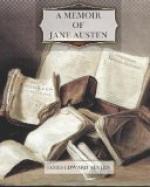Fanny. Perfectly, ma’am: pray continue your narration.
Mrs. Hum. Alas! it is nearly concluded; for I have nothing more to say on the subject.
Fanny. Ah! here is Daphne.
Enter DAPHNE.
Daphne. My dear Mrs. Humbug, how d’ye do? Oh! Fanny, it is all over.
Fanny. Is it indeed!
Mrs. Hum. I’m very sorry to hear it.
Fanny. Then ’twas to no purpose that I—
Daphne. None upon earth.
Mrs. Hum. And what is to become of—?
Daphne. Oh! ’tis all settled. (Whispers MRS. HUMBUG.)
Fanny. And how is it determined?
Daphne. I’ll tell you. (Whispers FANNY.)
Mrs. Hum. And is he to—?
Daphne. I’ll tell you all I know of the matter. (Whispers MRS. HUMBUG and FANNY.)
Fanny. Well, now I know everything about it, I’ll go away.
Mrs. Hum. and Daphne. And so will I. [Exeunt.
SCENE III.—The curtain rises, and discovers SIR EDWARD SPANGLE reclined in an elegant attitude on a sofa fast asleep.
Enter COL. ELLIOTT.
Col. E. My daughter is not here, I see. There lies Sir Edward. Shall I tell him the secret? No, he’ll certainly blab it. But he’s asleep, and won’t hear me;—so I’ll e’en venture. (Goes up to SIR EDWARD, whispers him, and exit.)
END OF THE FIRST ACT.
FINIS.
* * * * *
Her own mature opinion of the desirableness of such an early habit of composition is given in the following words of a niece:—
’As I grew older, my aunt would talk to me more seriously of my reading and my amusements. I had taken early to writing verses and stories, and I am sorry to think how I troubled her with reading them. She was very kind about it, and always had some praise to bestow, but at last she warned me against spending too much time upon them. She said—how well I recollect it!—that she knew writing stories was a great amusement, and she thought a harmless one, though many people, she was aware, thought otherwise; but that at my age it would be bad for me to be much taken up with my own compositions. Later still—it was after she had gone to Winchester—she sent me a message to this effect, that if I would take her advice I should cease writing till I was sixteen; that she had herself often wished she had read more, and written less in the corresponding years of her own life.’ As this niece was only twelve years old at the time of her aunt’s death, these words seem to imply that the juvenile tales to which I have referred had, some of them at least, been written in her childhood.




